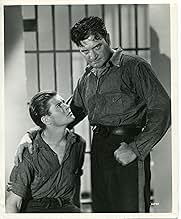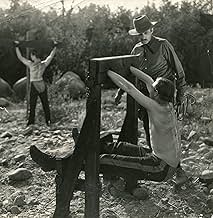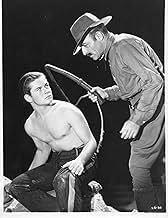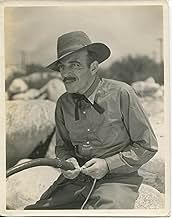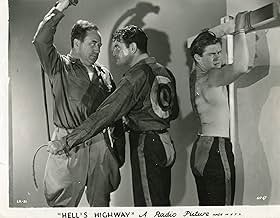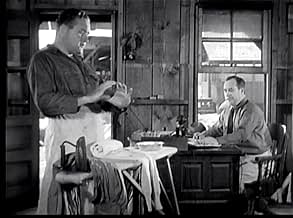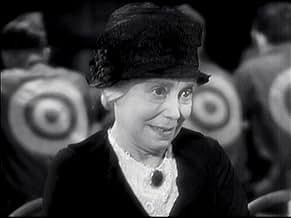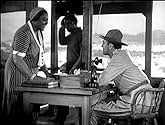Adicionar um enredo no seu idiomaChain gang prisoners forced to construct a "liberty highway" for their overseer chasten under his brutal stewardship, causing Duke Ellis to mastermind a mass riot.Chain gang prisoners forced to construct a "liberty highway" for their overseer chasten under his brutal stewardship, causing Duke Ellis to mastermind a mass riot.Chain gang prisoners forced to construct a "liberty highway" for their overseer chasten under his brutal stewardship, causing Duke Ellis to mastermind a mass riot.
- Direção
- Roteiristas
- Artistas
- Prêmios
- 1 vitória no total
- Rascal's Sweetheart at Visitor's Center
- (não creditado)
- Hunt Club Manager on Telephone
- (não creditado)
- Singer in Etude Ethiopian Chorus
- (não creditado)
- Singers of the Spirituals
- (não creditado)
- Turkey Neck Burgess - the Cook
- (não creditado)
- Direção
- Roteiristas
- Elenco e equipe completos
- Produção, bilheteria e muito mais no IMDbPro
Avaliações em destaque
Hard hitting & gritty, this neglected little drama is fascinating in its detailed portrayal of a tough subject. Road gang prisoners were still being systematically abused in 1932 and this film helped to shine a light into some very dirty corners, while at the same time delivering a compelling human interest story.
Richard Dix gives a typically fine performance as Duke Ellis, a bad guy with a good heart. He's able to dominate the other prisoners until his kid brother (very well played by Tom Brown) reveals his soft spot. Dix was a strong, virile actor who survived the transition from Silents to Talkies in good form and easily projected a persona of raw intensity. It is a shame that he is nearly forgotten today.
Although she receives third place billing, lovely Rochelle Hudson, as young Brown's girlfriend, has very little to do in her only scene. Of much more interest is elderly Louise Carter, as the distraught mother of Dix & Brown. In her few moments of screen time she delivers a terrific performance of a good woman barely holding on to her emotional balance. Her participation in the film alone would make it worth watching.
A handful of character actors also add to the movie's distinction: beefy Stanley Fields as a sympathetic prison officer; Charles Middleton as a mystic, other-worldly prisoner; C. Henry Gordon as the sadistic violin playing warden; Sandy Roth as a violent, nearly blind, prisoner; and Warner Richmond as a guard who fears he may also be a cuckold.
Clarence Muse & Fuzzy Knight have small roles as prisoners. Movie mavens will spot an uncredited Louise Beavers as Muse's visiting sweetheart.
An intriguing aspect of the film is how the black prisoners are used as a kind of Greek Chorus, their songs making ironic comment upon the action. Their 'Frankie and Johnny' parody sequence in particular is a quietly brilliant moment of film-making in how it encapsulates, in a very short time, a key plot twist.
Catch those rolling cages the convicts are kept in. They'd even be sub-standard for wild animals in a circus. But then, this is a down and dirty look at a chain-gang work crew, circa 1932, where shooting a con is made easier by the bull's eye on their backs. And if a con misbehaves, like not working fast enough to make the road contractor more money, it's a time in the sweat box, which is like doing time in an upright coffin-- you walk in, they carry you out. Now all this might sound like a lefty screenwriter's fevered dream, but the prologue assures us that the abuses are based on fact.
Then too, the cons are toiling in the middle of one ugly nowhere, and when the place catches fire, it's big enough to take down Chicago. No wonder the cons are looking to escape, and being a prison movie, they do. In my book, the best scene is the luckless deaf guy who never hears the bullet coming. I hope his last minute mumbo-jumbo was enough to get him past the pearly gates—it's a moving and inspired moment.
Then too, Dix makes a convincing boss con, as does C. Henry Gordon as the brutal boss muleskinner. But my money's on the cadaverous Charles Middleton (the hermit) who's on prison vacation from three wives and apparently dabbles in the black arts as when he foresees doom in the stars. His graveyard voice and grim reaper demeanor are like no other and can chill you to the proverbial bone.
Of course, being a Rowland Brown directed film, there are passing references to homo-erotic behavior, (see especially his Blood Money {1933}). All in all, he manages to blend the diverse story elements, including the black men's chorus, into a forcefully memorable whole. Too bad his directing career was so brief. He was that rarest bird in old Hollywood—a genuinely independent spirit.
It's a bang-up 60-minutes from struggling little RKO that takes no prisoners, so to speak. More importantly, there's something topical about tax-supported labor being used to enrich private contractors, as in the movie. Too bad, this over-looked little gem was assigned to pre-Code oblivion.
- The headlines in the opening sequence are from real newspapers, and refer to the Arthur Maillefert case which shocked the nation. On June 3, 1932, Maillefert was put in a shed similar to the one we see in the movie, with a chain wrapped around his neck and wooden stocks around his feet, and he died within an hour. The first article shown is from the Seattle Post-Intelligencer, "Prison Guards Accused of Murder As Tortured Youth Dies Chained In Sweat Box", and if you search for the next one, "Dark Age Tortures Revealed in Prison Camp Death Quiz", you'll see it's on the front page of the San Francisco Examiner from July 10, 1932. Filmmakers moved quickly; this movie was released September 23, 1932.
- The moment when a guard is about to whip the main character (Richard Dix), but hesitates. The camera pans down and we see a large tattoo on his back with the American flag, and the words "42nd Machine Gun Co. 167th Inf." We don't know much else about this guy and the film doesn't describe too much about his crimes, except that they're numerous and he's "habitual", destined for a life sentence - but finding out that he's a veteran humanizes him, and also points out that criminals have also done positive things in their lives. Given the horrifying outcome of the 'Bonus Army' encampment in Washington D.C. in July, 1932, this image would likely have resonated even more with filmgoers at the time.
- During the jail break the deaf prisoner is hiding in the tall grass, and doesn't see a couple of guys come up behind him. They tell him to "put 'em up", and of course he doesn't because he can't hear them, so they shoot him. It's another case of not knowing everything about someone else, and either misinterpreting or not understanding their actions as a result.
- I loved the treatment of African-American in the film. One wisely comments that the guards are more concerned with the way mules are treated than convicts, because mules cost money and the men are free. Another says to his visiting wife that "Sweetheart, you don't how tired a man does get when he don't get no loving," which in a simple way helps us empathize. I also loved the scenes where we hear groups singing the blues, and during one of them, an artist drawing a few funeral scenes.
- Lastly, something about seeing C. Henry Gordon trying to learn the violin at night using the "E-Z Method" made me smile; perhaps despite his inhumane ways, the film tries to point out he's human too.
I was less enamored with a few comments about women, one of which being that a lot of crime is done on behalf of women, and another that prison is a good way to escape being married to three women, since, you know, women are such balls and chains themselves. "I Am a Fugitive from a Chain Gang", also from 1932, is a better film with more emotional power, but this one is worth seeing too.
Você sabia?
- CuriosidadesRKO executives were concerned about a possible plagiarism suit by the author of the book and the movie version O Fugitivo (1932) in production at Warner Bros. at the time. Some deletions and changes were made until they were satisfied that no legal action would be taken.
- Citações
Duke Ellis: [Chatting with a convicted bigamist] How many women did you really marry?
Matthew the Hermit: How many banks did you really rob?
Duke Ellis: Never more than one at the same time.
Matthew the Hermit: It takes nerves of steel to rob a bank.
Duke Ellis: It takes a lot of backbone to keep three wives happy.
Matthew the Hermit: Yea, Brother!
Principais escolhas
- How long is Hell's Highway?Fornecido pela Alexa
Detalhes
- Data de lançamento
- País de origem
- Idiomas
- Também conhecido como
- Chain Gang
- Locações de filme
- Empresa de produção
- Consulte mais créditos da empresa na IMDbPro
- Tempo de duração
- 1 h 2 min(62 min)
- Cor
- Proporção
- 1.37 : 1

